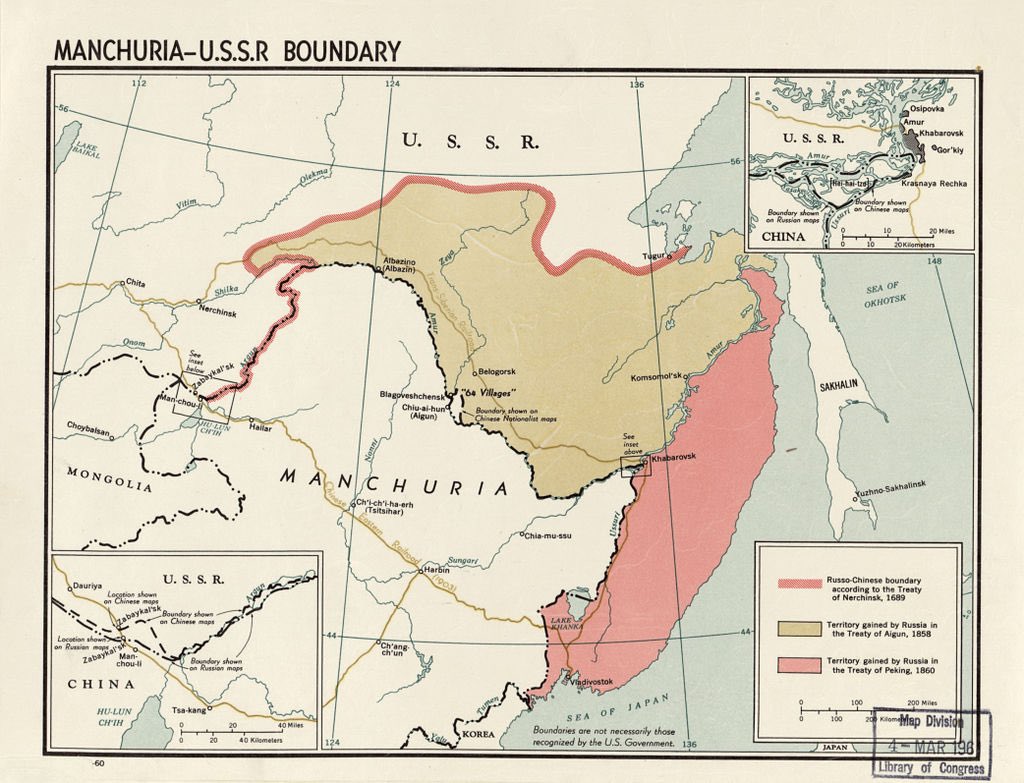The Treaty of Nerchinsk of 1689 was the first treaty between Russia and China under the Qing dynasty. The Russians gave up the area north of the Amur River as far as the Stanovoy Range and kept the area between the Argun River and Lake Baikal.
The treaty was "a triumph of intercultural negotiation" that gave Russians access to Chinese markets for expensive furs; Russians purchased porcelain, silk, gold, silver, and tea as well as with provisions for the northern garrisons.
The cross-border trade created a multiethnic character to Nerchinsk and Kyakhta in Siberia. They became locales for the interaction of Russian, Central Asian, and Chinese cultures.
Russian interest in the Amur River was revived in the 1750s. In 1757 Fedor Ivanovich Soimonov was sent to map the area. He mapped the Shilka, which was partly in Chinese territory, but was turned back when he reached its confluence with the Argun.
In 1757 Vasili Fedorovich Bradishchev was sent to Peking to investigate the possibility of using the Amur. He was received cordially and given a definite no.
The Russian Empire made important gains at the expense of China between 1858–60. The Qing (Ch’ing) dynasty’s easy defeat by Great Britain in the first Anglo-Chinese Opium War had made its glaring weakness apparent to the world.
Russian leaders, including Czar Nicholas I, feared British dominance in East Asia and resolved to expand into Chinese territory first.
In 1847 Nicholas appointed Nikolai Muraviev, an energetic proponent of Russian imperialism, governor of Eastern Siberia. Muraviev built up a large Russian force that included Cossack units, a naval squadron in the Far East, and set up forts and settlements along the Amur River.
The small and ill-equipped Chinese frontier garrison in the region was no match for the Russians when Muraviev demanded in May 1858 that China recognize Russian sovereignty on the land north of the Amur riverbank.
With more than 20,000 troops and naval support, he was able to force the Chinese representative to agree to the Treaty of Aigun, named after the frontier town where the meeting took place.
Under its terms, China ceded to Russia 185,000 square miles of land from the left bank of the Amur River down to the Ussuri River and agreed that the territory between the Ussuri and the Pacific Ocean would be held in common pending a future settlement.
The Chinese government was furious with the terms and refused to ratify the treaty but was helpless because of the ongoing Taiping Rebellion and others and a war with Great Britain and France, known as the Second Anglo-Chinese Opium War.
Events played into Russian hands in 1860, because resumed warfare between China and Britain and France had led to the capture of capital city Beijing (Peking) by British and French forces.
Russia was represented in Beijing at this juncture by the wily ambassador Nikolai Ignatiev, who had recently arrived to secure Chinese ratification of the Treaty of Aigun.
The supplementary Treaty of Beijing in November 1860 affirmed Russian gains under the Treaty of Aigun & secured exclusive Russian ownership of land east of the Ussuri River to the Pacific Ocean to Korea’s border, an additional 133,000 square miles, including the port Vladivostok.
This is how territories in Far East changed hands from Originally from Russian to China by Treaty of Nerchinsk in 1689 & back to Russia by Treaty of Augin in 1858 & Treaty of Beijing in 1860.
Thus Russian Empire (Tsarist Russia) without firing a bullet took back its territories from Qing China in 1858 when Qing China was facing Second Opium War & Taiping Rebillion which presented biggest danger to Qing Dynasty who were Manchus hailing from Manchuria region in NE China
Thus CCP’s love for cartographic maps & revisionism based on it is legendary. Needless to say Manchuria was never part of China & if China wants to go back to same era then first thing world must do is dismantle CCP which also did not exsist pre 1949.
While Russia gained Most of most of Manchuria back from China in Treaty of Aigun in 1858, they got the Pacific coast & Vladivostok through Treaty of Beijing in 1860 after humilating defeat of Qing China in 2nd Opium War at hands of Franco-British Alliance.

 Read on Twitter
Read on Twitter



